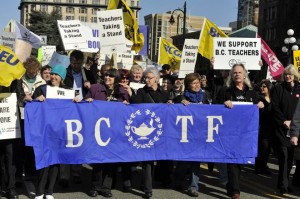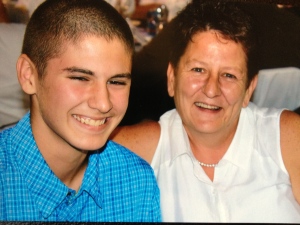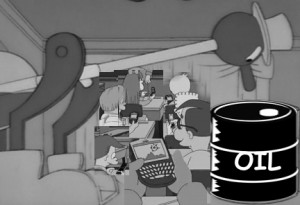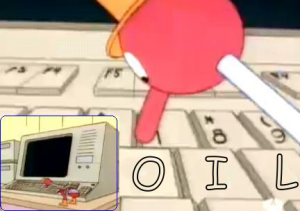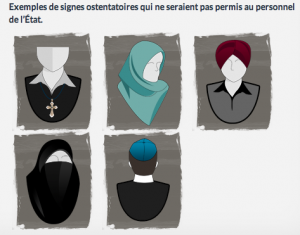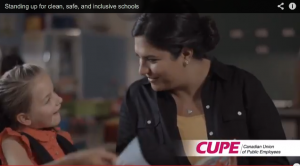British Columbia Teachers’ Federation, January 27, 2014: An historic day for public education and labour rights in BC. The BC Supreme Court reaffirmed that provincial legislation limiting teachers’ bargaining rights is unconstitutional, restored collective agreement provisions stripped in 2002, and ordered the province to pay $2 million in damages plus court costs.
The Court’s Judgment indicates the depths to which the BC Liberals descended in undermining collective bargaining in the province:
- The freedom of workers to associate has long been recognized internationally and in Canada as an important aspect of a fair and democratic society. Collective action by workers helps protect individuals from unfairness in one of the most fundamental aspects of their lives, their employment. [Summary, p.2]
- The Court has concluded that the government did not negotiate in good faith with the union after the Bill 28 Decision. One of the problems was that the government representatives were pre-occupied by another strategy. Their strategy was to put such pressure on the union that it would provoke a strike by the union. The government representatives thought this would give government the opportunity to gain political support for imposing legislation on the union. [Summary, p. 3]
- When legislation is struck down as unconstitutional, it means it was never valid, from the date of its enactment. This means that the legislatively deleted terms in the teachers’ collective agreement have been restored retroactively and can also be the subject of future bargaining. [Summary, p.4]
- Collective bargaining was seen as fulfilling an important social purpose, by providing a means to promote the common well-being. Collective bargaining is a means of providing equality in the workplace, diminishing the arbitrary power of the employer and allowing workers a means to protect themselves from unfair or unsafe work conditions. [para. 46]
- Just as it is hard to imagine a law that is otherwise an interference with a Charter right being found not to interfere because of pre-legislative consultation, it is even harder to imagine a situation where legislation is found to be unconstitutional as amounting to substantial interference with s. 2(d) rights, but then this unconstitutionality could be “cured” by the government “consulting” with the union after the fact of the legislation. This is essentially the unusual position the government takes in this case. [para. 91]
- As a matter of principle I am of the view that it would be rare that the government could rely on its “consultation” conduct after the fact of legislation declared invalid based on its breach of a s. 2(d) Charter right, to cure the unconstitutionality of the legislation, and to then pass virtually identical legislation. Such a process would encourage state actors to ignore s. 2(d) rights with impunity as there would be no practical consequences for a breach. [para. 92]
- But since the government insisted on starting from an extreme position, linking the two aspects of the unconstitutional legislation together, and insisting that all that was needed to fix the unconstitutional legislation was government consultation, the BCTF response position was rather predictable. If one side starts from an extreme position, it should not be surprised if the other side does not immediately compromise all that is important to it. [para. 356]
- From before collective bargaining began in 2011, the government expected that the round of collective bargaining would likely fail to result in an agreement between the BCTF and BCPSEA. This is because the collective bargaining mandates government had issued to BCPSEA, combined with a continued prohibition on negotiation Working Conditions, were predicted by the government to be so unacceptable to the BCTF.[para. 380] The government thus expected from even before collective bargaining began in March 2011 that it would lead to the BCTF calling a strike. [para. 381]
- The government saw that the failure of the two negotiating tables could be a useful political opportunity for it. As early as June 2011, the government was considering a strategy of a combined legislative response to an expected teachers’ strike and to Bill 28. [para. 383]
- The government thought that a teachers strike would give the government a political advantage in imposing legislation that the public might otherwise not support. It felt that the timing of legislation to deal with a teachers strike and failure of collective bargaining could fit conveniently with the timing of legislation to address the Bill 28 Decision repercussions. The government planned its strategy accordingly so that it could have one legislative initiative at the end of the one year suspension granted in the Bill 28 Decision.[para. 384]
- Rather than taking full strike action, instead the teachers withdrew some administrative, non-essential services, such as preparing report cards. Teachers continued to provide all teaching and classroom services. [para. 385]. When a full strike did not materialize, so important was a strike to the government strategy that in September 2011, Mr. Straszak planned a government strategy of increasing the pressure on the union so as to provoke a strike. [para. 386]

 Follow
Follow

